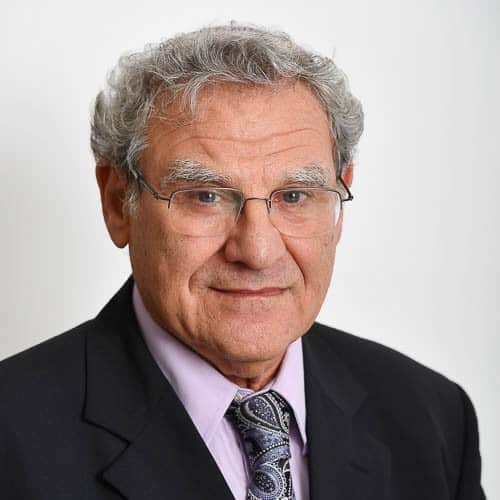Prof. Efraim Inbar: Giving citizenship to Arab east Jerusalemites is not only fair but also good for Israel on the strategic level.
The Jerusalem Post 28.4.2018
![]()
By Udi Shaham
When Suleiman Maswadeh wanted to participate in a student exchange program in Berlin, he couldn’t just fly there like the rest of his classmates in his west Jerusalem college.
Because he does not have an Israeli passport, he had to apply for a laissez-passer and book a meeting at the Interior Ministry branch in east Jerusalem; and because of the lack of proper services, it had to be done more than eight months in advance.
Because he has no passport – and the international agreements do not apply to him – he also had to go to the German Representative Office in Ramallah and convince officials there to issue him a visa.
This lack of proper freedom of movement is just one of a long list of freedoms that the 22-year-old – who was born in Jerusalem but did not get the status of a citizen – is deprived of.
Maswadeh is just one of some 300,000 east Jerusalem residents whose legal status is “permanent resident.”
After the Six Day War in 1967, when Israel took over the West Bank, it decided to annex east Jerusalem and the territories of some 28 villages around it into the new united Jerusalem.
In these areas (east Jerusalem and the surrounding villages) there were some 70,000 Palestinians, who were considered part of the population of the recently united city. Israeli law was applied in the areas, unlike in the West Bank, to which Israeli law was not applied, even when settlements were built in it.
However, these new residents of Jerusalem were not given the status of Israeli citizens, although they live in areas that are considered integral parts of Israel by law.
The reasons for this situation are not clear. Some say that the Palestinians refrained from any form of acceptance of Israeli sovereignty in the areas and never asked to become Israeli citizens. Others say that, even if this is true, Israel has never offered the residents this status, and raised obstacles before those individuals who did wish to become citizens.
Today, there are some 300,000 Arabs living in east Jerusalem, and around 20,000 of them are Israeli citizens.
As permanent residents, east Jerusalemites are entitled to receive assistance from the National Insurance Institute and other welfare services that Israelis are entitled to, and the free education system is open to them. They also have freedom of movement, to move freely throughout the entire country (unlike West Bank Palestinians, who are required to obtain a permit to enter into Israel).
As permanent residents, east Jerusalemites are not eligible to vote in the national election for the Knesset. However, they have the option to vote and to run in the municipal election to the Jerusalem City Council. A very low percentage of the residents chose to exercise this right, as part of the ongoing ban on Israeli institutions. Among many of the east Jerusalem’s Arabs, taking part in these sorts of activities was perceived as normalization of ties with Israel.
But things seem to be changing. A recent poll conducted by Prof. Dan Miodownik and PhD candidate Noam Brenner of the Leonard Davis Institute at the Hebrew University of Jerusalem shows that almost 60% of the population in east Jerusalem supports the idea of participating in the upcoming October municipal election.
Maswadeh acknowledges that there is a ban against Israeli institutions and says that, from his point of view, it was justified and a legitimate political stance, but on the other hand he thinks that in this situation, people are losing more than they are gaining.
“For how long can this ban stay in place? You are living within the borders of the country, and this state is running your life,” he said.
“It decides about the budgets [that you will receive]. So why shouldn’t you have electoral power within it [the Knesset], so that you could achieve political goals?” he asks.
Experts are labeling this conception as part of the “Israelization” trend of east Jerusalemites. While in the past 50 years, the Arab residents of east Jerusalem have kept their Palestinian characteristics and culture and maintained a strong connection to their people in the West Bank, in recent years – especially since the construction of the security barrier around Jerusalem that physically separated it from the rest of the West Bank – more and more east Jerusalemites want to enter the Israeli economic market, learn Hebrew and, to a certain extent, participate in the Israeli political sphere, as we recently witnessed with Ramadan Dabash of Sur Bahir forming a party to run in the upcoming election.
THE ENTRANCE to Israel Ordinance (1974), which regulates the issue of permanent residency, says that a license of a permanent resident to reside in Israel will expire if the resident left Israel and resided in another country. In the articles of the ordinance, it says that residing in another country means either receiving the status of a citizen of another country or that of a permanent resident in another country, or staying out of Israel for over seven years.
East Jerusalemites testify that, due to this ordinance, they are in a constant struggle to prove that they never left, and many of them say that they collect bills, receipts and any other document that proves that they never left Jerusalem.
This also means that east Jerusalemites do not have the option to improve their quality of life by moving to a suburb of the city in the West Bank or by studying abroad, for instance, without fearing loss of access to their hometown.
An Ir Amim report says that between 1967 and 2014, the state revoked the status of permanent residency from 14,416 Arabs living in east Jerusalem.
Moreover, according to the law, the status of these Arabs is equal to tourists who entered Israel, as if after 1967, some 70,000 Arabs have suddenly entered Israel overnight. Maswadeh says that he finds this legal situation “absurd.”
“What happened in 1967 is not that these people decided to enter Israel; it’s not like they decided to cross a certain border,” he says. “They were already here when Israel took over the area and said [that] from now on, we have sovereignty over this area.”
In 2017, a High Court of Justice ruling regarding the revoking of the residency of Akram Abed al-Hak gave a boost to the principle that the Arabs of east Jerusalem are not visitors but natives.
“Unlike those who immigrated to Israel and are asking to receive a status in it, they have a strong connection to their place of residence as people who were born in this area – in some cases, their parents and grandparents, too, were born there – and they have been leading family and communal lives in it for years,” Justice Uzi Vogelman wrote. Justice Menachem (Meni) Mazuz wrote that east Jerusalem residents should be viewed as “native residents.”
It is still unclear what the impact of this ruling will be.
OBTAINING CITIZENSHIP, which could secure the status of the residents and make it permanent, without the ability of the state to revoke it, is also not easy.
The Citizenship Law (1952) allows east Jerusalemites to apply for citizenship. In order to become a citizen, one must meet certain criteria. Among them is that one has been in Israel for at least three out of the past five years, one speaks basic Hebrew, and one has pledged allegiance to Israel by saying: “I hereby declare that I will be a loyal citizen to the State of Israel.”
The process also includes police and Shin Bet (Israel Security Agency) background checks, and at the end of it, one needs to receive the approval of the Interior Ministry.
However, statistics show that while the rate of requests for citizenship is rising, the rate of approval of citizenship requests among east Jerusalemites is declining.
According to ministry figures, appearing in a new book by Arnon Ramon of the Jerusalem Institute for Policy Research, there were 69 requests in 2003; 900 in 2009; and 1,081 in 2016. In the years 2003-2016, there were 8,556 requests in total (not including children’s requests, or those who are still in preliminary stages and awaiting an interview).
The graph of approvals of citizenship requests is in a general direction of decline. While there are more and more requests, only 3,362 of them were approved between 2003 and 2016.
East Jerusalemites also complain about lack of sufficient ministry facilities, which not only challenges them in their day-to-day lives but also hampers their ability to obtain citizenship.
Some complain of the never-ending lines and bad conditions in the Wadi Joz ministry branch, a place that many have to encounter often, and is vital for obtaining citizenship. The residents testify that they do not have the option to go to other branches, outside of east Jerusalem.
The Association for Civil Rights in Israel filed a petition to the High Court of Justice on Sunday to allow the residents to use other branches because of the “unbearable situation in the east Jerusalem branch,” and said that this policy is discriminating and harming their right of equality.
The Administration of Border Crossings, Population and Immigration said in response that the issue of the heavy workloads in all its branches, including in east Jerusalem, is a known issue, and that it is currently working to solve it, “as we were directed by the interior minister.
“We are currently looking for a location for another branch that will serve the residents of east Jerusalem,” a statement reads. “But there is no doubt that there are overloads that are created due to many demands, and it is definitely not a policy.”
THIS SITUATION implies that among the decision-makers, who are aware of the rising wave of citizenship requests, there is no intention to move toward a path in which the residents of east Jerusalem would become citizens.
In the past year there were some initiatives by politicians regarding the status of east Jerusalem residents, but they do not deal with the overall issue of citizenship. The first is a law, initiated by MK Amir Ohana (Likud) and endorsed by Interior Minister Arye Deri (Shas), that grants the interior minister the power to revoke the status of permanent resident from individuals who were involved in terrorist activities or “breach of trust.”
Another initiative is a plan, put forward by Jerusalem Affairs Minister Ze’ev Elkin (Likud), to separate the neighborhoods that are located behind the security barrier from Jerusalem, such as Kafr Akab and Shuafat refugee camp. By doing so, some 150,000 residents would be subtracted from Jerusalem’s population, which would help overcome the “demographic challenge,” as Elkin told The Jerusalem Post in an interview in November.
On the Left, MK Yoel Hasson (Zionist Union) submitted a bill – which did not pass the preliminary reading – to hand over most of east Jerusalem to the Palestinian Authority, and make these areas’ status the same as the West Bank’s “Area B,” meaning under Israeli military control and Palestinian civil control. The explanatory notes of the bill said that “as of today… the rate of Palestinians in Jerusalem is getting close to 40%…. Without a proper initiative, Jerusalem could find itself in the upcoming years with a mayor who is associated with the Palestinians national moment, or worse, with a bloody hell of terrorist activities that would be a deathblow to the city.”
These initiatives target specific issues, mainly from the security perspective, which sees the east Jerusalemites as a threat or a burden, and they are not contributing to easing the situation for some 300,000 Israeli ID holders, or to once and for all determining the future of the capital.
SOME SAY that the fact that Israel’s capital consists of roughly 40% noncitizens and is not moving in any direction that would solve the problem is harming its democratic character.
Ir Amim executive director Yudith Oppenheimer says that Israel is intentionally not taking a stance on this issue, and chooses to annex the land but not the people on it.
“Israel never offered these residents citizenship. It is a common fairy tale,” she said. “It created here a strange mixture in which it annexed the land and applied its law on it but did not fully annex the people sitting in it. It gave them a kind of a conditional status.
“They took people in their own city and land, and by certain political moves, they made their status of living here temporary,” she said.
Oppenheimer maintains that Israel’s indecisiveness regarding the future of the Arab residents of east Jerusalem derives from a “demographic fear that almost half of the ‘eternal united capital of Israel’ will be Palestinians.”
Ir Amim, which supports the two-state solution with east Jerusalem as the Palestinian capital, does not see citizenship as an objective, but rather promotes reaching a situation in which the Arabs in east Jerusalem would not fear losing their ability to live in the city, and could create an independent cultural life, until an overall solution is found.
“Even if you solve this issue and grant Israeli citizenship to the entire population of east Jerusalem, there is still the political issue over the future of Jerusalem.
“Solving this issue should not replace the overall solution to the conflict. We know that we are stuck in this situation for a while now, and it is not likely to go away soon.
“So I believe that in this situation, the identity of the Palestinians should not be blurred, and their existence as a collective should not be erased,” she said. “They should be allowed to exercise their civic rights by planning and constructing in their own space and to be entitled to have their own institutions. I think that it is elementary,” she added.
ON THE other side of the political spectrum is Prof. Efraim Inbar, president of the Jerusalem Institute for Strategic Studies, who does not see this issue as a threat to Israeli democracy, but reckons that making the east Jerusalemites citizens is not only fair to them but also good for Israel on the strategic level.
However, Inbar maintains that the reason the Arabs of east Jerusalem do not have Israeli citizenship is primarily that they didn’t want it.
“The responsibility for the situation of lack of citizenship lies mainly on the Arabs of Jerusalem,” Inbar said.
“They didn’t really want it, for their own reasons.
“First of all, they didn’t want it because of the political situation of east Jerusalem, which was in doubt, and they had fears that they would be thrown under an Arab entity, which is very much familiar to the fear of the Druse population on the Golan Heights.
“Secondly, they were scared because of terrorism. They knew that being identified with Israel [obtaining citizenship] could be dangerous for them,” he said.
Inbar said that whether the Israelis want it or not, there are over 300,000 Arabs living in east Jerusalem. “Just like those in Umm el-Fahm, they’re here, and that’s it,” he said.
In addition, Inbar stressed that he supports the “Israelization” process that the society is going through, and added that side by side with that, they “should receive the status of citizens.”
“We are currently in an era in which we are witnessing a change in their attitude,” Inbar said.
“For instance, there are more and more among the Arabs of Jerusalem who want to send their children to a school with Israeli matriculation, but we cannot meet their demands, because there are not enough classrooms. So you can see the ‘Israelization’ process growing larger.
“They started a new discourse that is not nationalistic but, rather, [one] of promoting equal rights. They want to be equal and to receive the same services,” he added.
When it comes to the future of the city, Inbar said that making the residents of east Jerusalem citizens is another means of reinforcing the idea that Jerusalem will not be divided.
“This idea to divide the city and to separate ourselves from them is a misconception,” he said.
This notion is derived from Inbar’s conception that sees Israeli control of Greater Jerusalem as a strategic necessity for Israel’s security.
“Jerusalem sits on a main junction that watches over both east and west,” Inbar said. “Most Israelis live along the shore. If we want to protect the Land of Israel, our defensive line should stay in the Jordan Valley. If we want to move military forces from the shore to the Jordan Valley, the only route that is mainly populated by Jews across the country is Tel Aviv-Jerusalem-Ma’aleh Adumim-the Jordan Valley.
“This is why we should keep the Arabs in east Jerusalem nonhostile to us,” Inbar added. “We should live together, and it is the government’s responsibility to look after them.”
The Jerusalem Post, 28.4.2018






 - בניית אתרים
- בניית אתרים